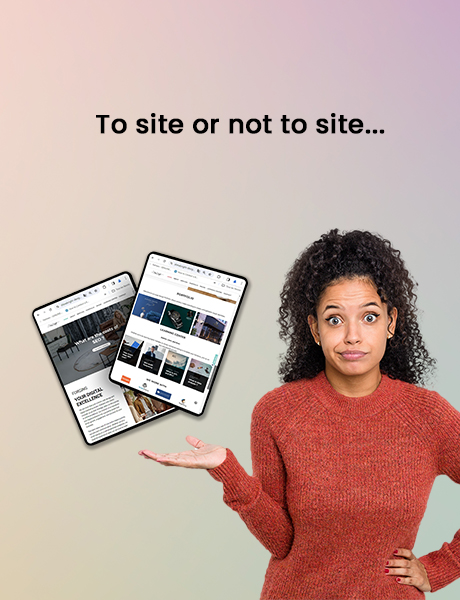ShineBright Design team
To site or not to site…that is the digital question!
In the digital age, the prominence of social media platforms has led many to question the relevance of maintaining a traditional website. However, websites continue to hold significant advantages over social media accounts for several reasons:
1. Complete Control and Customization: Websites offer unparalleled control over content, design, and functionality. Unlike social media platforms, where you are limited by their design and rules, a website can be tailored to precisely fit your brand’s identity and needs. This customization extends to everything from the layout to the user experience, allowing for a unique presence on the internet.
2. Professionalism and Credibility: Having a dedicated website is often seen as a sign of a more established and credible entity. It shows investment in your brand or business and suggests a level of professionalism that social media profiles can struggle to match. This perception is crucial for gaining the trust of potential customers, clients, or audience.
3. Search Engine Visibility: Websites are essential for Search Engine Optimization (SEO). A well-optimized website can rank high in search engine results, making it easier for new customers to find you. Social media profiles do appear in search results, but they don’t offer the same level of SEO control and potential for visibility as a dedicated website.
4. Content Ownership and Stability: Social media platforms are volatile environments where policies and algorithms change frequently, often without warning. These changes can significantly affect how and if your content is seen. With a website, you own your content and are not at the mercy of these external changes. This stability ensures your audience can always find you and access your content as intended.
5. Detailed Analytics: Websites allow for more comprehensive analytics compared to social media. Using tools like Google Analytics, you can gain deep insights into your audience’s behavior, preferences, and engagement with your site. This data is crucial for informed decision-making and strategy development.
6. Functionality and Integration: Websites can be integrated with various tools and systems, such as e-commerce platforms, booking systems, or customer relationship management (CRM) software. This integration is often more robust and customizable than what is available through social media platforms.
7. Long-Form Content and Information Hub: Websites are ideal for hosting long-form content, detailed product information, and resources that social media cannot accommodate effectively. They serve as a central hub for all information about your business or brand, offering a comprehensive resource for your audience.
8. Audience Reach and Diversity: While social media is excellent for community engagement and reaching a specific demographic, a website has a broader reach potential. It is accessible to anyone on the internet, not just users of a particular social media platform, and can cater to a more diverse audience.
9. E-mail List Building: Websites allow for more effective email list building strategies. By encouraging visitors to subscribe to newsletters or updates, you can build a direct line of communication with your audience, independent of social media algorithms.
10. Longevity and Dependability: Social media platforms can fade in popularity or even shut down (as seen in the past), but a website remains a stable digital asset. It’s a long-term investment in your digital presence, unaffected by the rise and fall of social media trends.
Unveil your online essence
In conclusion, while social media is an invaluable tool for engagement and can significantly enhance an online presence, a website offers a level of control, credibility, and versatility that social media cannot match. It remains a cornerstone of a comprehensive digital strategy.
” Your website, your digital legacy.”
ShineBright Design team
If you are looking for a webdesigner, get in touch and let’s talk about your project.









